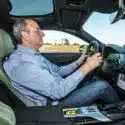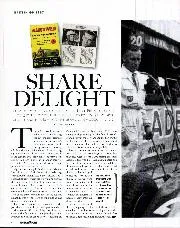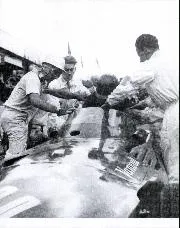“That said, Stirling never won the World Championship when other team-mates of mine did and, oddly enough, I think his rampant competitiveness was instrumental in denying him.
“He was never content with simply being the best driver. He had to have the best machinery too and, as number one driver, he could pick and choose. Unlike today, two seemingly identical grand prix cars could be very different under the skin and he’d try my engine in his chassis, his engine in my chassis, fiddling with this, fiddling with that. It was his right as the top driver in the team but, even if you have the most skilled mechanics, the more often you pull a car apart and rebuild it, the more likely it is that something will go back in not quite right. It was his perfectionism that drove it and it was that which explains, at least in part, why he was never champion.
“Also, while Stirling never gave less than 100 per cent of himself to any race, so he also expected the same of his machinery. I’m not saying he was a car-breaker or mechanically unsympathetic, but his policy of going flat out from the flag meant that if there was a weakness somewhere, he’d increase his chances of finding it compared to some others.
“Another reason he never won the World Championship was his punctilious sportsmanship. When Mike Hawthorn spun in Portugal in 1958 and they were going to disqualify him for driving against the flow of traffic, it was Stirling who spoke up in his defence and got him reinstated. Mike earned seven points for second place that day and beat Stirling to the title by one… But that was pure Stirling – he could have so easily said nothing, but it would have been the wrong thing to do.
“He was the same on the track. Because I was his number two and I would never commit the cardinal sin of taking off my team-mate, I never got into a wheel-to-wheel battle with him in a Vanwall, but I watched him a lot and raced hard against him in other years and never saw him do anything that wasn’t completely correct, nor did I hear anyone else complain. He was tough, for sure, but absolutely fair.
“Stirling was the kind of racer who would never give up and I have often wondered what would have happened to him had his accident at Goodwood in 1962 not forced him to retire. I believe it saved his life. The cars were getting no safer. He’d have kept going until, one day sooner or later, the law of averages caught up with him. When I retired at the end of 1961, I took the literal definition of retirement, whereby you cease to do that which you have been doing. I started a family and while I hugely enjoyed my time in racing, it was not worth risking my life any more. For Stirling, racing was life and I think it still is. He’s still buzzing all over the world racing this and that and while I admire him for it, it’s not for me at all.”
And there the tape ends. We talk a little more about life outside the paddock. Brooks and Moss always got on well, but they were never close buddies, not like Moss and Collins, who shared an equal interest in all aspects of grand prix racing, up to and including the extra-curricular. There was and remains a huge mutual respect between the two greatest British racing drivers never to be world champion and they still meet regularly, though never to talk about the old times.
It is time to go. Tomorrow Tony is heading to California for six weeks, to see his daughter, and there’s packing to be done. But as I rise and turn for the door, something is clearly on his mind. He looks at me, gently takes my arm and says: “Do you know, Andrew, Stirling and I first became team-mates 50 years ago. And in all that time, we’ve never had a single argument. How many team-mates can say that?” All too few, I suspect.



